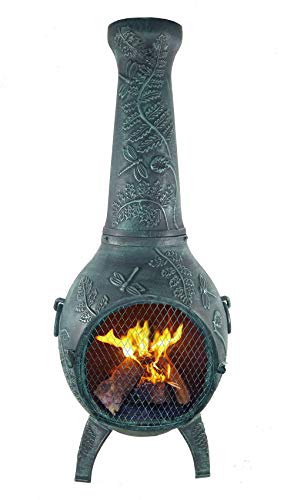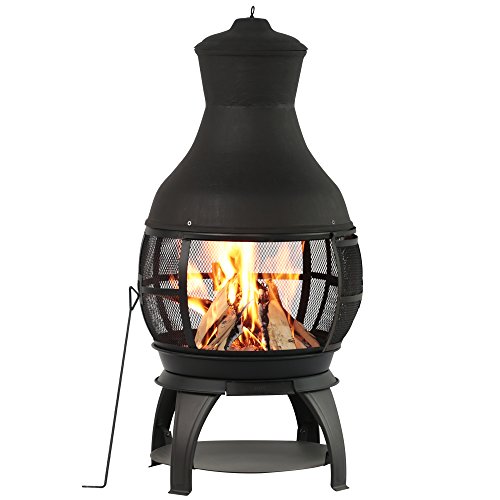Fire Pits & Chimineas Techniques To Simplify Your Daily Life Fire Pits…
페이지 정보
작성자 Zachary 댓글 0건 조회 2회 작성일 24-12-12 19:37본문
 Chimineas Vs Fire Pits
Chimineas Vs Fire PitsLike a stove with a potbelly Chimineas have an opening in the front to allow for stacking fuel, and an attached chimney that draws smoke into. They are available in a range of materials, such as clay or terracotta for a traditional look, and iron or cast iron for durability.
Clay models are fragile and require careful handling while metal models are able to endure higher temperatures and more rough handling. Both create warmth and ambience to outdoor spaces.
Chimineas
Chimineas, which are comparable to fireplaces on a variety of levels, are made for outdoor use. They give an attractive appearance. They are usually made of clay or terra cotta and are often decorated with themes inspired by Mexican culture. Modern chimineas tend to be constructed from materials like cast iron and aluminium which are more resistant to breaking and damage than clay.
Originally a stove with a potbelly The chiminea was first developed in Mexico and other Western states. They are typically used to entertain however, they can also be a focal piece in any outdoor space. A chiminea's chimney's length can draw smoke upwards and keeps it from people who are seated around it, in contrast to fire pits which typically have an open flame that could create sparks and embers that can spread over the ground and surrounding areas.
Both chimineas and fire pits add warmth to outdoor spaces, but they have different advantages and requirements for maintenance. The design of the chiminea can be adapted to various styles of gardens, while the minimalist, sleek design of a fire pit is suitable for a variety of outdoor settings.
The maintenance difference between chimineas versus fire pits is also largely due to the materials used. Terra clay, terracotta, and cast iron are more susceptible to deterioration. Therefore, chimineas require more frequent maintenance.
Both kinds of outdoor fireplaces are very popular because they provide a warm and inviting space for families and friends to meet for dinners or drinks. However, a chiminea's more protected and enclosed design makes it better suited for more intimate groups and is more efficient in warming the space. Its more pronounced safety benefits are due to the fact that it provides greater protection against sparks and embers which could be thrown off the fire, and fire pits need to be carefully placed to minimise this risk and must be monitored constantly.
Fire pits
When you are planning an outdoor space, you may be faced with the decision to add an outdoor fire pit or chiminea. Both options offer warmth and style to a garden or patio however they differ in design, operation, and security features. We'll help you select the right option for your space by examining initial costs, maintenance expenditures, fuel and more. We'll also look at the heat output as well as smoke and safety.
Chimeneas or chimineas are freestanding fireplace that has an open chimney that can be used to cook. They can be constructed from clay, metals like cast iron or steel or even stone or cement. They come in many shapes sizes, shapes, and styles to fit different outdoor decors. Depending on the material they are made from, they can be insulated for extra comfort and a smaller flame, which helps reduce the risk of sparks escaping and ensures safe operation.
Chimineas can be made with charcoal or wood however, it is recommended to make use of dried or seasoned logs as moist wood releases more smoke and is less effective in heating. Chimineas require a larger flame to keep warm, which can result in more smoke. This can be minimized by using a log grates, ensuring proper airflow, and maintaining the chiminea.
fire pits chimineas pits can be constructed out of a variety of materials and steel is the most sought-after because of its durability and affordable. Some are portable, and others are designed to be permanent fixtures within an area. They are typically built into the ground or on a deck that is raised and are available in a variety of shapes, sizes, and finishes to match a range of outdoor decors. They can be powered by gas, providing added convenience and control, or by wood and charcoal.
Although they may be less troublesome to maintain than chimineas, fire pits are generally considered more dangerous than Chimineas. The open design of fire pits can create more sparks, which could be dangerous for children and pets. To avoid accidents, they must be placed away from flammable items and under constant supervision. They also generate an enormous amount of smoke and ash, which can be uncomfortable for some people.
Safety
Chimineas, as well as fire pits, can add warmth and appeal to an outdoor space. However they also carry potential dangers. Both are extremely hot, and you should be careful when using them, especially when you are around children and animals. Both can be used on surfaces that are susceptible to cracking when heated (see below) and so putting the sand layer inside your chiminea near me or brick and stone slab underneath the fire pit is advisable. Both can also release significant amounts of smoke, which can be a problem if you live in a place that is prone to wind. The chiminea is a better option because of having the fire contained within it, meaning it is less vulnerable to the winds blowing embers and ash around. The opening is only one-sided and you cannot see the back, so it's simple to leave the chiminea in a safe place if the wind is strong.
Make sure you use only seasoned, kiln dried logs for all kinds of fireplaces. They'll burn better and produce a lot less smoke. Avoid burning materials like trash, twigs, and paper which could quickly ignite and cause an explosive reaction.
Be aware of any local bans on burning. They can be caused by adverse conditions, which can result in high levels of emissions and increase levels of fine particle pollution to dangerous levels. Inhaling these harmful toxins can cause respiratory problems.
Keep an empty bucket of water or a garden hose handy in case the fire gets out of control. Also, make sure that the area surrounding your fire pit is free of twigs, branches, and leaves that are prone to catch fire. It is also recommended to keep a small first aid kit near the fire pit in case someone is injured by sparks or smoke. Both a chiminea or a fire pits & chimineas pit will last for an extended period of time when they are maintained properly. However, terracotta and clay are more fragile than metal and can break under extreme temperatures and therefore a cast iron chiminea or fire pit is a better option for a durable and long-lasting addition to your patio.
Maintenance
If you do not maintain your chiminea outdoor, or fire pit in the backyard, it could cause serious dangers. It could cause serious damage or injury if used incorrectly or placed too close to a home, shrubbery, or other structures. It is crucial to ensure that only natural materials such as wood are burned and that no garbage, plastics or liquid fuels should be employed. You should also be aware of the weather forecasts for your area to be sure you're following the rules regarding when you can burn. In the event of an emergency it's best to keep a fire extinguisher and hose at hand.
A chiminea is a traditional outdoor fireplace that provides warmth and ambiance to patios and gardens. Made from clay, metal or cast iron, chimineas are popular in a variety of designs and finishes. Many chimineas have intricate traditional designs that provide an authentic look to the outdoor environment. Chimineas are also considered to be more environmentally friendly than fire pits as they produce less smoke and dust emissions.
To keep your chiminea in top rated chiminea condition, it is recommended to regularly clean it. Begin by removing any unburned wood and ash from inside the grate. Then, you can start small flames with few pieces of kindling. Let it burn for about an hour, then carefully dowse the flames with water to smother them completely. Allow the chiminea's temperature drop before lighting another fire.
Chimineas can be a stunning addition to any outdoor space They require more care than fire pits. They need to be cleaned regularly to avoid corrosion and other types of damage from the elements. Chimineas are also quite fragile, and can break or crack if they are not handled with attention to detail.
The choice of buying a chiminea, or a fire pit, ultimately rests on your personal preferences and your budget. Both options have advantages however, you must consider the initial cost and the long-term costs before deciding which is the best option for your home. If you want an option that is more durable for your home, think about a custom built fire pit or chiminea made of tough materials like stone or steel that are able to withstand harsh weather conditions and more frequent use.

댓글목록
등록된 댓글이 없습니다.